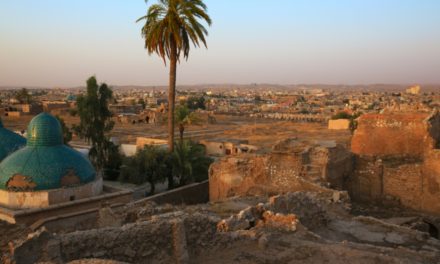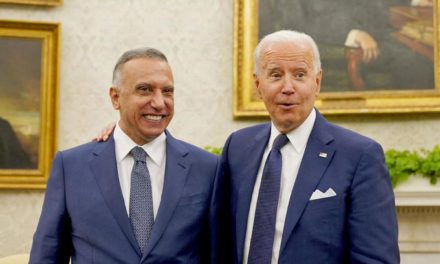The visit of Ali Shamkhani, the Secretary General of Iran’s National Security Council and the representative of Iran’s Supreme Leader in Iraq, was important for several reasons this article will cover.
Shamkhani’s visit to Iraq on the 7th of March, 2020 is the first after the assassination of General Qassim Soleimani in Baghdad on the 3rd of January. The main goal of the visit was to send a message to the Americans saying that despite all the efforts of the Trump administration, Iran has not been excluded from Iraq’s affairs, as Iraq remains important to Iran, with Tehran continuing to play an important role in Iraq’s internal politics.
The importance of this visit multiplies when taking into consideration that since the assassination of Qassim Soleimani, no high-level American politician has visited Baghdad. Therefore, we can see in Shamkhani’s visit that Iran is a step ahead of its American competitor in Iraq.
However, what message does Shamkhani’s visit send?
Without doubt, Shamkhani’s military experience, whether as Defence Minister, Minister for the Revolutionary Guard, Head of the Revolutionary Guard and Iran’s Army Naval forces, in addition to his previous major roles in the Revolutionary Guard (Head of the Revolutionary Guard in Khozestan Province, Head of the Revolutionary Guard Land Forces, Deputy Head of Reconnaissance and Operations of the General Chief of Staff of all forces) or his political and diplomatic experience as member of the Strategic Council for International Relations and the Secretary General of Iran’s National Security Council makes him the most ideal candidate for Iranians to fill the role of Soleimani in Iraq.
The reality that one cannot ignore is that in the 17 years after the establishment of the ‘New Iraq’ following the collapse of Saddam’s regime, it is practically impossible to choose a prime minister and form a new government in Iraq without the blessing and eventually the green light from Tehran and Washington. However, within what Iran regards as a vacuum that Soleimani has left behind, we have seen how Mohammed Tawfiq Allawi failed and had to withdraw his candidacy for prime minister before Adan Al-Zurfi was nominated, who is seen as closer to the U.S.
If the political experience of Mohammed Tawfiq Allawi made Iraq face a complicated and sensitive situation, it seems that it also pushed the country further down a dark tunnel as the country is suffering from a sharp economic and public health crisis. With the dangerous situation that created fears for Baghdad’s government and Iraq’s political elite, one could say that this also poses a serious threat to Iran’s interests in Iraq.
Based on this Iranian reading, Shamkhani conducted his visit to Iraq. Apart from whether he can revitalize the role Soleimani played in Iraq in light of the recent developments in the region, especially when it comes to Iraq, Shamkhani’s visit should be given the importance it deserves as Tehran supported Mohammed Tawfiq Allawi’s nomination and that of others. Shamkhani’s visit shows that if the situation in Iraq remains like this, we should expect all other major and international regional players attempting to play a larger role in Iraq in the coming days.
The analysis that claims Shamkhani’s meetings with important people in Baghdad to be a sign of success or the finalization of his current mission in Baghdad is therefore not accurate. Rather, Iran follows up in light of Shamkhani’s visit on anything that could turn into an Achilles’ Heel for its interests in Iraq. This will be achieved through a series of steps, amongst them continued diplomatic visits and communication with its partners in Iraq, as well as deals with a wider spectrum of political personalities and currents, continuously surveying the political environment for political and security developments in Iraq that could threaten its interests. It seems that these activities are on the top of Shamkhani’s schedule more than ever.
Even if we regarded the previous analysis as correct, we cannot see in the progress Shamkhani makes on choosing a prime minister a large success. Given the level of complexity and division in Iraq’s political, social, security, and economic environment, the appointment of a new prime minister only represents the start and is a small step on the path of leading this country out of its dire situation.

Hayder Al-Khafaji
Hayder Al-Khafaji is a researcher on Middle Eastern affairs with a specialist focus on Iraq-Iran relations. He holds a postgraduate certificate in Islamic Studies from Birkbeck College, University of London, and a master’s degree from Middlesex University where he is currently completing a Professional Doctorate in Muslim cultures.










